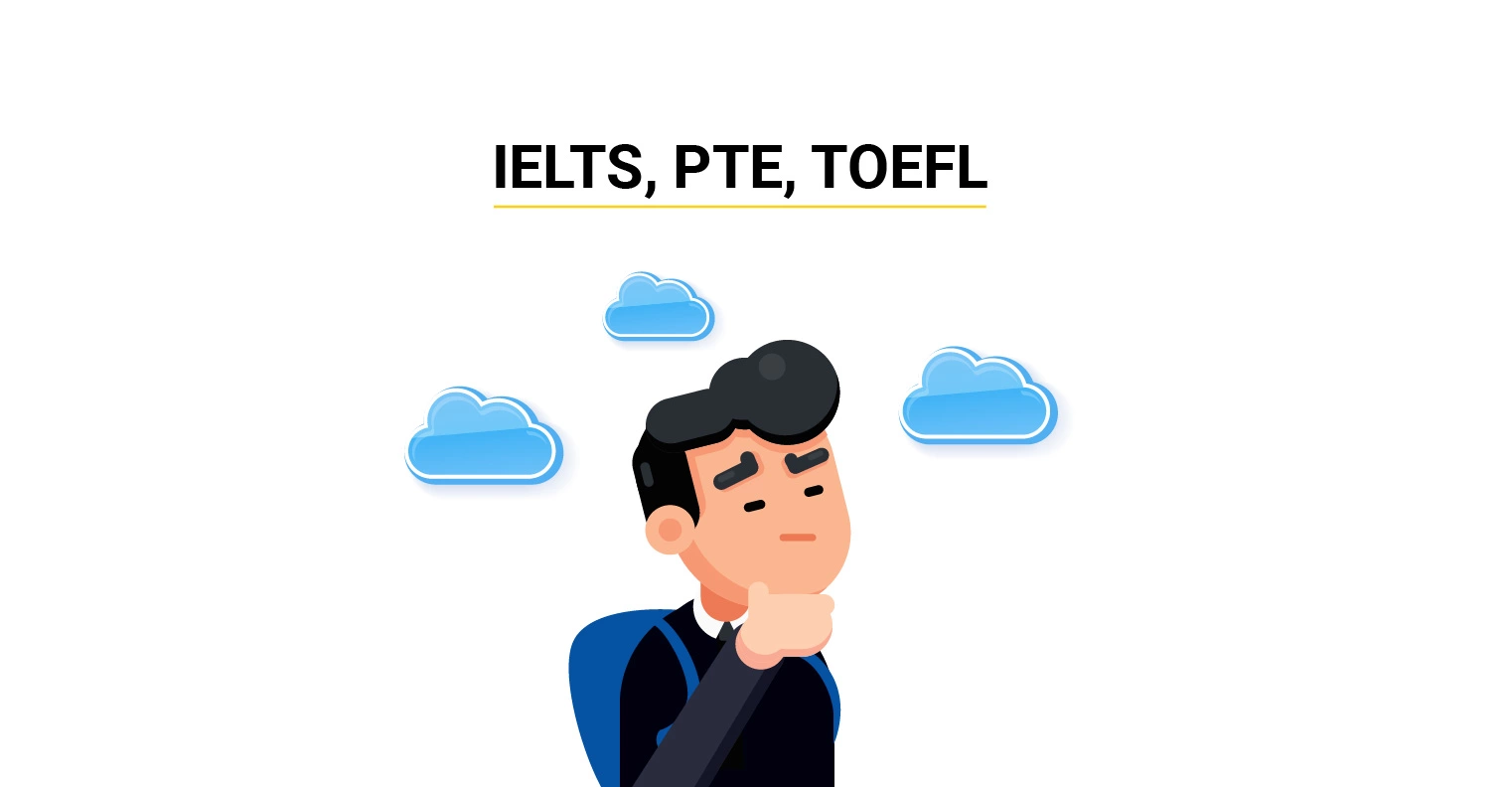
Once you come across applying to foreign universities, clearing exams like IELTS, PTE, or TOEFL becomes mandatory. Pursuing courses in a foreign country requires a lot of hard work. These tests are to examine your proficiency in the English language, that is, your ability as a non-native speaker to listen, speak, read, and write in English.
You might think ‘What exam should I clear?’, ‘What are the differences between PTE, TOEFL, and IELTS?’, or ‘ Will the exam type make any difference while applying in various international universities?’. Well, the basic element to look for is what exam is your university’s requirement. Some foreign universities may accept all the exams, but that is not the case for every university. TOEFL is being widely accepted in US-based colleges, while IELTS is being accepted by European and Australian colleges.
Let’s take a detailed look at PTE, TOEFL, and IELTS.
PTE stands for Pearson Test for English, which is a computer-based aiming at non-native speakers who desire to study abroad. It's developed by the Pearson PLC Group in 2009. Since it is relatively new to the market, it's currently accepted in Australia, the USA, UK, Ireland, Singapore, Canada, and New Zealand.
Pearson Language Tests is a unit of the company that provides PTE Academic, PTE General, which is used for immigration, and PTE Young Learners. These tests provide scenario-based exams that are predominantly evaluated by computers rather than humans, which reduces the waiting time for the results of students.
PTE Academic is the set of tests that evaluate non-native English speakers who desire to take part in a university-level English language instruction program. The test includes MCQs, essay writing, graphs, and figures, where often 2 sets of skills are put together. The test comprises three sections, Speaking and Writing, Reading, and Listening, which is conducted in a single session of 3 hours, sitting at a computer in a secure test environment. You will need to score a minimum of 65+ on a scale of 10 - 90, which is the measuring system based on the Global School of English.
TOEFL is an acronym for ‘Test Of English as a Foreign Language’, which is a standardized test that measures the ability of non-native English speakers to use and understand English as practiced at the English-speaking foreign universities. TOEFL is the oldest of the lot, developed by ETS (Educational Testing Service), an international non-profit organization. They made it into action in the year 1964 to ensure English proficiency for those who wish to join US universities.
In the past, TOEFL was accepted mainly by US-based colleges, but as it got popularised, it started being accepted in over 160 countries with over 4,000 test centers. You can take the test in a pen-and-paper method or the internet-based method which was introduced in late 2005, replacing the computer-based tests. The TOEFL iBT test via the internet is highly popular because of its quick processing.
The four-hour-long test comprises four sections, namely reading, listening, speaking, and writing consecutively provided with a break of 10 minutes after the first two sections. This MCQ-based test requires a minimum of 90 - 95 as an entry requirement out of 120.
IELTS (The International English Language Testing) System is one of the major English language tests in the world that tests the English language proficiency for non-native English speakers. It provides tests in two modules, IELTS General Training, which is for those who plan to pursue non-academic or work experience, and IELTS Academic module which is for those who want to enroll themselves in universities, or other educational institution
Development and administration by the British Council, IDP Education, and Cambridge Assessment English in the year 1980 and accepted by over 140 countries, designed to cover the full range of ability from a non-user to an expert.
The test includes all the basic elements of English learning: listening, reading, writing, and speaking, with a duration of 2 hours and 45 minutes. Evaluation is done by certified IELTS examiners with a face-to-face interview assessment. There is no minimum required score to pass the test, but on a 9-band scale, a 6.5 may require for entry.
Now you can pursue your education with NIOS Course in Dubai.
All three tests cover the key elements of English learning: listening, speaking, reading, and writing. Let’s check the key differences between PTE, TOFEL, and IELTS:
|
Key differences |
IELTS |
PTE |
TOFEL |
|
IELTS follows this format with one interview to test speaking and listening |
PTE being the news entry into the field, it comprises a mandatory essay followed by different questions and tasks. |
TOEFL follows the typical American format, which includes spoken responses, essays, and multiple choice. |
|
IELTS scores on a 9-band scale |
PTE scored on a scale of 10 - 90 |
TOEFL with 30 points per section coming up to a total of 120 |
|
IELTS with a duration of 2 hours and 45 minutes, gives you the option to write your essay, but the result has a chance of being biased because of human involvement. |
PTE being a computer-based test gives unbiased results hence considered easier with a duration of 3 hours. |
TOEFL has a multiple-choice format, making its difficulty level average, but it is the longest test with a duration of 4 hours |
|
|
|
|
Let’s Conclude
The decision to choose which test to take falls on the conditions of the university you are targeting. As you can see how different each test can be, you need to prepare accordingly so; it is advisable to look at some sample materials to ace the test.

Vandana is a highly qualified IELTS (British Council trained), and TESOL holder, with over 15 years of experience. She is a proactive professional with a progressive approach to teaching and lesson planning. She has the sound ability to maintain curriculum development. She is a science graduate, Six Sigma and PMP trained individual who has also worked with multinational companies in the Training & Quality domain for more than a decade. Right now, Vandana is working as an IELTS Trainer with Edoxi Training Institute, Dubai.
